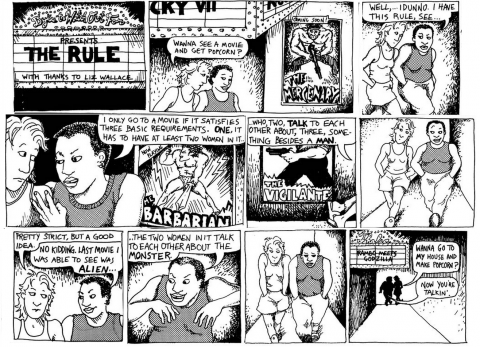- Woody Guthrie, ‘Old Man Trump’ and a real estate empire’s racist foundations - Will Kaufman (The Conversation)
- Novelist Obliterates The Bundy Militia — And Oregon’s Largest Newspaper — In 194 Words - Ryan Koronowski (Think Progress)
- The New Republic lost the battle over American liberalism - Jonathan M. Ladd (Vox)
- Ultra-Rich 'Philanthrocapitalist' Class Undermining Global Democracy: Report - Sarah Lazare (Common Dreams)
- Hollywood's Gender Divide and its Effect on Films - Lyle Friedman, Matt Daniels, Ilia Blinderman (Polygraph)
- The Deep Affinity Between Sarah Palin and Donald Trump - David A. Graham (The Atlantic)
Woody Guthrie, ‘Old Man Trump’ and a Real Estate Empire’s Racist Foundations
By Will Kaufman
January 21, 2016
The Conversation
In December 1950, Woody Guthrie signed his name to the lease of a new apartment in Brooklyn. Even now, over half a century later, that uninspiring document prompts a double-take.
Guthrie’s two-year tenancy in one of Fred Trump’s buildings and his relationship with the real estate mogul of New York’s outer boroughs produced some of Guthrie’s most bitter writings, which I discovered on a recent trip to the Woody Guthrie Archives in Tulsa. These writings have never before been published; they should be, for they clearly pit America’s national balladeer against the racist foundations of the Trump real estate empire.
Novelist Obliterates The Bundy Militia — And Oregon’s Largest Newspaper — In 194 Words
By Ryan Koronowski
January 19, 2016
Think Progress
Award-winning author Ursula K. Le Guin has lived in Oregon for more than half a century, and has regularly visited the region surrounding the Malheur National Wildlife Refuge for 45 years. Ever since armed militants took over the refuge in a dispute over ranching fees on public lands, Le Guin has “been following the situation very closely,” she said in an email to ThinkProgress.
So when she saw an article titled “Effort to free federal lands” in the Sunday Oregonian, she did what any self-respecting, world-renowned author would do.
She wrote an epic Letter to the Editor that was a spirited defense of American public lands.
The New Republic Lost the Battle over American Liberalism
By Jonathan M. Ladd
January 13, 2016
Vox
The New Republic is in another period of turmoil. Facebook co-founder Chris Hughes, who purchased the magazine in 2012 and provoked a mass staff exodus last year when he replaced its editor, is selling the magazine.
The media landscape has changed since the heyday of Peretz's ownership in the 1970s, '80s, and '90s. Then, policy magazines were one of the main places for journalists, academics, politicians, and other wonks to debate politics. Now the policy magazines of previous decades face diminishing relevance and worsening financial prospects. The New Republic is in especially dire straits. Whether it can survive in the future depends on it regaining a viable place in both the economic and ideological marketplaces.
Ultra-Rich 'Philanthrocapitalist' Class Undermining Global Democracy: Report
By Sarah Lazare
January 15, 2016
Common Dreams
From Warren Buffett to Bill Gates, it is no secret that the ultra-rich philanthropist class has an over-sized influence in shaping global politics and policies.
And a study just out from the Global Policy Forum, an international watchdog group, makes the case that powerful philanthropic foundations—under the control of wealthy individuals—are actively undermining governments and inappropriately setting the agenda for international bodies like the United Nations.
Hollywood's Gender Divide and its Effect on Films
By Lyle Friedman, Matt Daniels, Ilia Blinderman
Polygraph/
There’s this thing called the Bechdel Test. It measures just how male-dominated our beloved Netflix nights really are. To pass, films need to satisfy three requirements:
#1 It has at least two women in it
#2 Who talk to each other, about
#3 Something besides a man
It’s a low bar, but many good movies don’t pass. Birdman fails. Avatar fails. Fucking Toy Story fails. On bechdeltest.com, a site for crowdsourcing Bechdel Test results, about 40% of films don’t pass. It’s a sad state since women exist in life, like, half the time.
The Deep Affinity Between Sarah Palin and Donald Trump
By David A. Graham
January 19, 2016
The Atlantic
There’s a natural affinity between Trump and Palin. Both are candidates who have capitalized on their ability to speak to the grievances of white, working-class Americans. They delight in inflammatory rhetoric—getting a rise out of the right people is much of the fun—and despise the press, even as their success depends in large part on managing to capture journalists’ attention. Both have a tendency to extemporize, producing sentences that are impossible to diagram and often to understand. Both have been reality-TV stars, though Trump rode his television fame to political success, while Palin rode her political success to a television contract.
This similarity is true as far as it goes, but it undersells the depth of the similarity between Trump and Palin. And in fact, that similarity owes something to the very same Trumpian deviations in conservative orthodoxy that might otherwise seem to separate him from Palin.


Spread the word